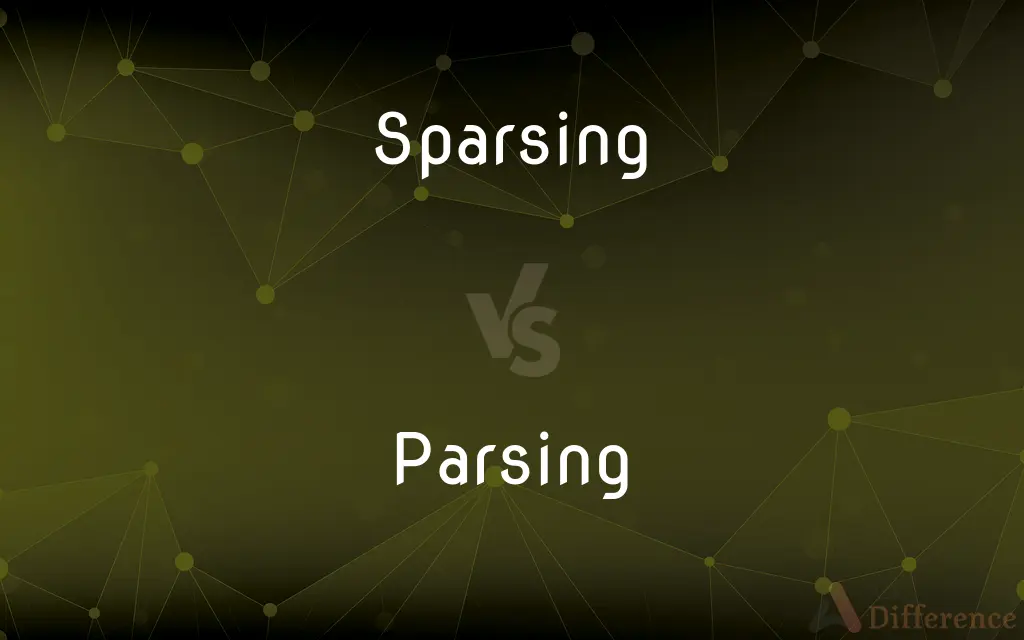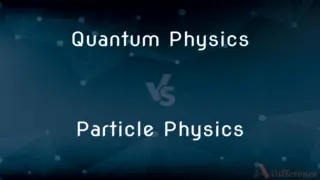Sparsing vs. Parsing — What's the Difference?
By Tayyaba Rehman — Published on November 17, 2023
Sparsing involves making something less dense or less populated, while parsing is the act of analyzing a string of symbols, often in linguistics or computing.

Difference Between Sparsing and Parsing
Table of Contents
ADVERTISEMENT
Key Differences
Sparsing refers to the act or process of thinning out, making something less dense, or spreading things out. Parsing, on the other hand, is a term predominantly used in linguistics and computer science to describe the process of analyzing a string of symbols to determine its structure.
In the context of data, sparsing might mean filtering out irrelevant data points or making a dataset less dense. In contrast, parsing could involve analyzing data, such as reading code in a programming language to understand its structure and meaning.
When looking at a physical space, sparsing might mean distributing objects or people more thinly across it. Meanwhile, parsing in a linguistic context would be breaking down sentences into their constituent parts to understand their grammatical relationships.
If you were managing a forest, sparsing could involve thinning out trees to manage the forest's health or growth. In computational linguistics, parsing a sentence means breaking it down into its parts of speech or semantic roles.
Sparsing often has a spatial or density-related connotation. Parsing typically concerns the breakdown and understanding of structures, particularly in language or programming.
ADVERTISEMENT
Comparison Chart
Related Field
General usage (e.g., data, physical space)
Linguistics, Computer Science
Primary Use
Making something less dense or populated
Analyzing a string of symbols for its structure
Connotation
Thinning out, reducing density
Breaking down, understanding
Action
Distribute, spread out
Analyze, dissect
Example
Thinning out a dataset
Breaking down a sentence into parts of speech
Compare with Definitions
Sparsing
Reducing the number of elements in a set.
Sparsing the data helped improve the algorithm's efficiency.
Parsing
The act of analyzing a sentence to identify its grammatical components.
She excelled at parsing complex sentences.
Sparsing
The process of making something less dense.
The sparsing of the forest helped manage its growth.
Parsing
The process of breaking down a string of symbols in computing.
The compiler is responsible for parsing the code.
Sparsing
Thinning out or diminishing the frequency of occurrences.
Sparsing her appointments gave her more free time.
Parsing
Analyzing or examining something closely.
He spent hours parsing the contract for any discrepancies.
Sparsing
Decreasing the concentration or intensity.
Sparsing the mixture reduced its potency.
Parsing
Decoding or interpreting a sequence.
The software is parsing the user's input.
Sparsing
Distributing things more thinly across a space.
Sparsing the arrangement made the room feel more open.
Parsing
Dissecting information to understand its structure.
Parsing the data revealed hidden patterns.
Sparsing
The act or process of making something sparse
Parsing
To break (a sentence) down into its component parts of speech with an explanation of the form, function, and syntactical relationship of each part.
Sparsing
(mathematics) The reduction to zero of elements of a matrix
Parsing
To describe (a word) by stating its part of speech, form, and syntactical relationships in a sentence.
Parsing
To process (linguistic data such as speech or written language) in real time as it is being spoken or read, in order to determine its linguistic structure and meaning.
Parsing
To examine closely or subject to detailed analysis, especially by breaking up into components
"What are we missing by parsing the behavior of chimpanzees into the conventional categories recognized largely from our own behavior?" (Stephen Jay Gould).
Parsing
To make sense of; comprehend
I simply couldn't parse what you just said.
Parsing
(Computers) To analyze or separate (input, for example) into more easily processed components.
Parsing
To admit of being parsed
Sentences that do not parse easily.
Parsing
(uncountable) The act or process in which an agent (person or computer) parses something (a text, a program).
Parsing can be difficult.
Parsing
(countable) An instance of that act or process; a parse.
A parsing of a sentence about a horse can yield several possible results.
Parsing
(countable) Any result of such an instance; a parse; an acceptation.
Upon review, for the word horse, the parsing "animal" was rejected in favor of the parsing "piece of gymnastic equipment".
Parsing
Present participle of parse
Common Curiosities
In what fields is parsing commonly used?
Parsing is predominantly used in linguistics and computer science.
How is sparsing different from parsing?
Sparsing involves reducing density, while parsing involves analyzing a string's structure.
Can sparsing be related to data?
Yes, sparsing can mean filtering out or thinning data points in a dataset.
Can sparsing be applied to physical spaces?
Yes, sparsing can refer to distributing objects or people more thinly across a space.
What is a common application of parsing in computing?
Parsing is commonly used in compilers to analyze and understand code.
Is parsing always related to language?
While commonly associated with language, parsing can also refer to analyzing any structured sequence.
Is parsing the same as decoding?
Parsing can involve decoding, but it primarily refers to understanding and analyzing structure.
What does sparsing mean?
Sparsing refers to making something less dense or populated.
Can sparsing relate to concentration or potency?
Yes, sparsing can mean decreasing the concentration or intensity of a substance.
Is parsing a one-time process?
No, parsing can be iterative, especially if analyzing complex structures.
Does sparsing always mean removal?
Not always; sparsing can also mean redistributing without necessarily removing elements.
Does sparsing have a negative connotation?
Not inherently; it depends on context. In some cases, sparsing is beneficial.
What tools are used for parsing in programming?
Compilers, interpreters, and parsers are tools used to parse code in programming.
Why is parsing important in linguistics?
Parsing helps understand the structure and relationships in sentences, aiding in comprehension and analysis.
Can sparsing affect performance?
Yes, in contexts like data processing, sparsing can improve efficiency by reducing data density.
Share Your Discovery

Previous Comparison
Natural Rubber vs. Vulcanized Rubber
Next Comparison
Quantum Physics vs. Particle PhysicsAuthor Spotlight
Written by
Tayyaba RehmanTayyaba Rehman is a distinguished writer, currently serving as a primary contributor to askdifference.com. As a researcher in semantics and etymology, Tayyaba's passion for the complexity of languages and their distinctions has found a perfect home on the platform. Tayyaba delves into the intricacies of language, distinguishing between commonly confused words and phrases, thereby providing clarity for readers worldwide.
















































